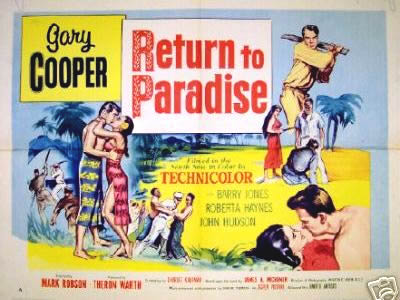
RETURN TO PARADISE
US, 1953, 100 minutes, Colour.
Gary Cooper, Barry Jones, Roberta Haynes, Moira Walker.
Directed by Mark Robson.
Return to Paradise is based on a short story by James Michener, Mr Morgan. This is the character played by Gary Cooper. Return to Paradise is a collection of stories which was the sequel to Michener’s Tales of the South Pacific.
The film was made on Samoa and incorporates a lot of the islanders in the action as well as rituals and dance. It became something of a celebrated event in Western Samoan history – for many decades afterwards.
Gary Cooper had just won his second Oscar for High Noon and is at home in this kind of tropical setting. He contrasts with British actor Barry Jones (Seven Days to Noon) who portrays a very strict pastor – interesting given the subsequent history of evangelisation of Western Samoa, especially by American groups like the Mormons and Seventh Day Adventists.
Gary Cooper portrays a drifter, clashes with the pastor, becomes involved with a young woman on the island – but still is an adventurer in the South Seas.
The film was directed by Mark Robson who began his directing career in the 40s with some horror films for producer Val Lewton. He directed a number of romantic films like My Foolish Heart, action films like The Bridges at Toko- Ri. With The Inn of the Sixth Happiness and Peyton Place in the late 50s he moved into big-budget spectacles – and made a number of these during the 1960s including Von Ryan’s Express and Valley of the Dolls. His second-last film was Earthquake.
1. Was this a good drama, adventure?
2. A film of the fifties, reflecting on the past, James Michener and his style of story? The presentation of the South Pacific, the colour, the music etc.?
3. The effect of the structure, the narrative by Rory, his point of view about the past? The bad past, Cobbitt, the contrast with Morgan as hero, his views from childhood? How involved did audiences get?
4. The film's presentation of the effect of the missionaries, the people's loss of morale, church and church-going, the strict observance of the Sabbath, the emphasis on sin, modesty and the taking of lanterns by couples, the role of the wardens and their fascist style, the general unhappiness? Why did the people succumb to this kind of Christianity?
5. How just was this presentation of Christianity? As administrated by Cobbitt? The immediate impact of Cobbitt and his hold over the islanders, his fanaticism, his hostility towards Morgan? The explanation of Cobbitt's past, his father, the death of his wife, his trading post? The nature of his hold on the Islanders, his cruelty, his justifying his ways through God? The wardens as his arm of administration?
6. How did the film show the people ready to revolt against Cobbitt, their behaviour in Church, their hostile attitudes, their rallying, to Morgan?
7. How heroic a man was Morgan? Gary Cooper's style, Morgan as a South Seas type, a wanderer, fleeing from something, the tough American, ready to confront but not be confronted, a liberating figure, yet tight and untrustful, his philosophy of not trusting people, a breakthrough of love but no permanence in it, his ability to abandon people?
8. The insurrection of the island, the small issues yet with the great reaction, the bashing of Maeva, Morgan bashing the warden, the insurrection against the wardens and their banishment, Morgan being a hero for the island, Maeva and her devotion to him?
9. How well delineated was the character of Maeva? As amongst all the other islanders? Morgan's not wanting to marry her, his love for her, her pregnancy, his going away, the impact of her swimming, the birth and her death? Morgan's not waiting for his daughter?
10. What was the effect of all this on Cobbitt? What lessons did he learn? The significance of his seeing the people go to church of their own free will and his sitting amongst them? Hls mellowing? His being a better man than Morgan in his mellowing?
11. The growing legend of Morgan after his departure, the merging into World War Two? The atmosphere of the war and the Invasion of the South Pacific, the effect on the islanders, the effect on Pory and his education, the various changes on the Island? Cobbitt and his role and his wanting to help the Allies etc.?
12. The significance of Morgan's return? Its effect on the people, old friendships, the effect on his daughter and btlx her love and then her hostility and suspicion? The effect on him? his helping the pilots, his strictness as regards his daughter’s flirting and his imitating the old methods of Cobbitt, his being restrained by Cobbitt even with the gun? What had happened?
13. The contribution of the episode with the pilots, their landing, the welcome, Faber's infatuation with Turia? The hostile stance of Morgan, their departure?
14. How were the Issues presented to Morgan as regards his daughter and his staying?
15. What did Morgan confront in his decision to stay and remain at home?
16. How interesting a picture of South Sea Islands, colonies, adaptation to the twentieth century?